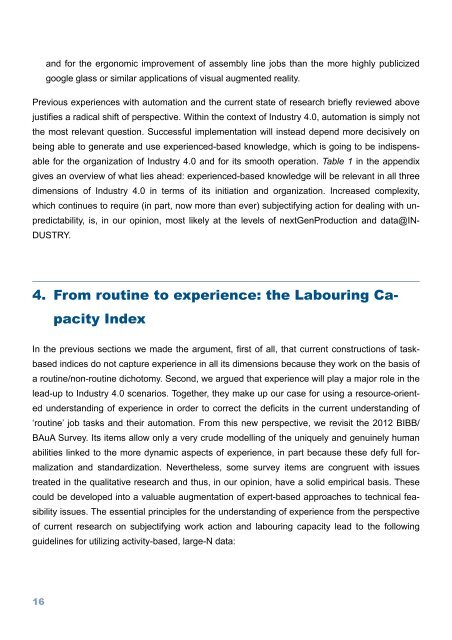DRAFT
237QXgQ
237QXgQ
Create successful ePaper yourself
Turn your PDF publications into a flip-book with our unique Google optimized e-Paper software.
and for the ergonomic improvement of assembly line jobs than the more highly publicized<br />
google glass or similar applications of visual augmented reality.<br />
Previous experiences with automation and the current state of research briefly reviewed above<br />
justifies a radical shift of perspective. Within the context of Industry 4.0, automation is simply not<br />
the most relevant question. Successful implementation will instead depend more decisively on<br />
being able to generate and use experienced-based knowledge, which is going to be indispensable<br />
for the organization of Industry 4.0 and for its smooth operation. Table 1 in the appendix<br />
gives an overview of what lies ahead: experienced-based knowledge will be relevant in all three<br />
dimensions of Industry 4.0 in terms of its initiation and organization. Increased complexity,<br />
which continues to require (in part, now more than ever) subjectifying action for dealing with unpredictability,<br />
is, in our opinion, most likely at the levels of nextGenProduction and data@IN-<br />
DUSTRY.<br />
4. From routine to experience: the Labouring Capacity<br />
Index<br />
In the previous sections we made the argument, first of all, that current constructions of taskbased<br />
indices do not capture experience in all its dimensions because they work on the basis of<br />
a routine/non-routine dichotomy. Second, we argued that experience will play a major role in the<br />
lead-up to Industry 4.0 scenarios. Together, they make up our case for using a resource-oriented<br />
understanding of experience in order to correct the deficits in the current understanding of<br />
‘routine’ job tasks and their automation. From this new perspective, we revisit the 2012 BIBB/<br />
BAuA Survey. Its items allow only a very crude modelling of the uniquely and genuinely human<br />
abilities linked to the more dynamic aspects of experience, in part because these defy full formalization<br />
and standardization. Nevertheless, some survey items are congruent with issues<br />
treated in the qualitative research and thus, in our opinion, have a solid empirical basis. These<br />
could be developed into a valuable augmentation of expert-based approaches to technical feasibility<br />
issues. The essential principles for the understanding of experience from the perspective<br />
of current research on subjectifying work action and labouring capacity lead to the following<br />
guidelines for utilizing activity-based, large-N data:<br />
16


